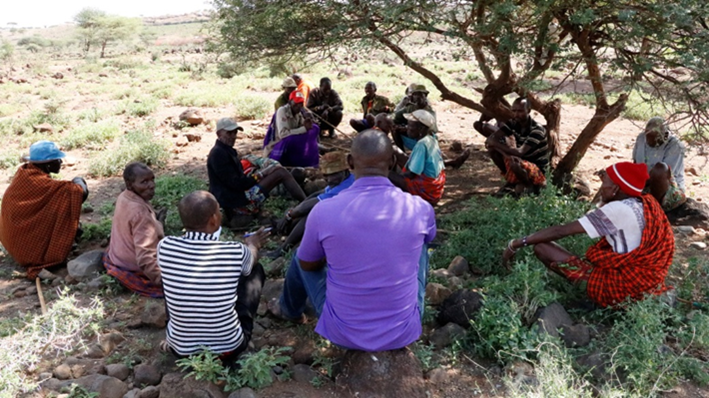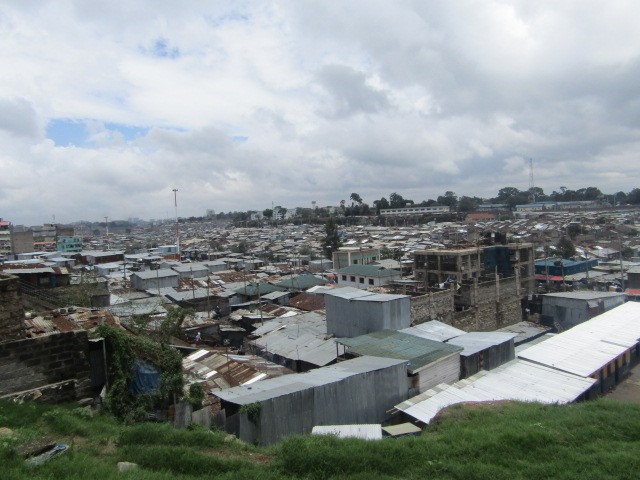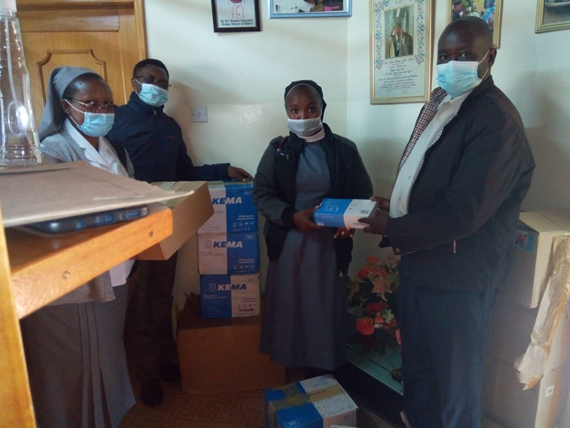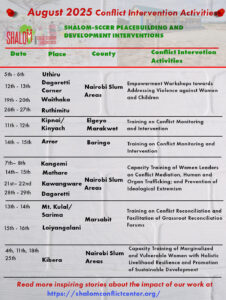Covid-19
Recently in Nairobi’s Kibera slum, distribution of flour and cooking oil sparked such desperation that two people unfortunately lost their lives in a stampede. This tragic episode illustrates that aid support anywhere must be well planned and handled with location-sensitivity. For all aid interventions, what is most critical to success is engagement with local community leaders first, to achieve a system of organization that they help create and implement.
And that’s exactly what Shalom-SCCRR has to offer. Our organization is uniquely poised to guide response to the coronavirus pandemic with a network of key influencers across Eastern Africa that are already trained in our proven conflict resolution process.
We are advising our network on how to educate those in their communities or spheres of influence, and how to allocate resources in the best way. We are helping to negotiate conflicts between neighboring inter-ethnic groups as we have done in the past with our acclaimed community-based methodology. We are helping to change perceptions, generate ceasefires, establish negotiation mediums and stabilize peace processes, even in these scary, uncertain times.

Here are nine positive intervention steps related to the health crisis that Shalom-SCCRR is taking in Eastern Africa right now:
Mobilize
Shalom-SCCRR resource people have initiated door-to-door community awareness efforts to enhance awareness of the virus and prevention techniques. They are monitoring visitors to their communities and ensuring the 14-day isolation period. And they are helping ensure that motorcycle transport drivers take only one passenger at a time, and that both driver and passenger are wearing face masks.
Youth leaders in Shalom-SCCRR groups are reaching out to traditional warriors in the villages, and supporting translation activities by health officers.
Raise Awareness
Communicating to Eastern African’s poor is a challenge because literacy is low, access to the media and internet is limited, and there is a distrust of polarized news broadcasts. Disenfranchised groups get their news and information through local leaders that they trust and respect, like chiefs, elders, religious leaders, women’s group coordinators, teachers and guardians of the peace – the exact people in Shalom-SCCRR’s network of trained influencers. We work with them to craft the messages that make sense for their constituents.
In this health crisis, we are assimilating WHO and governmental directives to communicate to our influencers detailed information on virus prevention measures, hygiene, how to take care of the sick, and how to get help when needed. We are calling the influencers on cell phones, and using text messaging, emails, social media and the Shalom-SCCRR website as we can.
Translate
There are 68 languages spoken in Kenya alone, so the involvement of Shalom-SCCRR influencers is critical for translating messaging into indigenous dialects. Our staff speaks many languages, so we translate messaging into as many as makes sense to accomplish the goal, in addition to Swahili and English. Our influencers translate that into yet more dialects.
Instruct and Supply
Shalom-SCCRR has been disseminating production instructions for homemade masks and protective gear to women’s cooperatives, sewing enterprises and youth groups,and encouraging them to supply Kenyan health care workers and at-risk neighbors. Shalom-SCCRR group members in urban slums are manufacturing home-based hand-washing soap for distribution and use in public toilets.
Shalom-SCCRR is also supplying masks and hygiene products such as sanitizers and soap to remote and impoverished areas, as well as volunteer and aid workers. Beneficiaries include an orphanage in a Nairobi slum and a children’s home in Marsabit County, among many others.
Verify and Affirm
Shalom-SCCRR fortifies community leaders and influencers for successfully meeting challenges. We provide support to enhance pride and ownership of the interventions and results. This public collaboration deepens the bonds to Shalom-SCCRR, and gives the influencers more esteem among their constituents, which will lead to future benefits and reconciliation dividends.
Cooperate
Shalom-SCCRR is collaborating with communities, governments, institutions and organizations working in Eastern Africa to share information, resources and effort to address the needs of vulnerable populations in the best way possible – through local influencers with situation-appropriate approaches and systems.

Advise
With a proven conflict transformation and peacebuilding process that is a model for conflict zones around the world, Shalom-SCCRR is in a position to offer consultation to other charitable and faith-based organizations who want to help the poor and desperate people in Eastern Africa, especially in conflict zones. They may not know how to properly implement, or have the local knowledge or systems to do so safely and prudently.
Train, Solidarity and Monitor
Monitoring conflict hotspots for flare ups between warring groups, particularly over scarce resources, must be done consistently to ensure there is no ground lost on fragile peace agreements previously achieved. This new source of tension and economic distress could lead sides to revert to old, intractable and violent measures unless there is immediate response to flare-ups.
We are in constant dialog with 93 strategic community leaders in 26 project locations in the border interface region of Kenya with South Sudan and Ethiopia, as well as the poverty stricken urban environments of Nairobi. Already we’ve been involved in training healthcare workers in clinics and their outreach personnel in remote semi-arid terrains. Some of these outreach clinics, for example in the Loima District of Turkana County, were also in grave shortage of sanitizers, soaps, detergents as they confronted the coronavirus.
Shalom-SCCRR, through the heartfelt assistance of donors around the world, are meeting and responded to these needs. Every life is sacred and equally important. We must respond now.
Pray
We pray for the lives of those infected with coronavirus, for the departed souls, for the grieving families. We pray for the wisdom to advise people in ways they will take seriously to take preventive measures to protect others. And we pray that peace and grace will surround the vulnerable at this critical time.
We believe that jointly overcoming this public health crisis will generate a greater sense of interdependence, and a greater need to coexist in the spirit of compassion, peace, truth, justice and mercy. We need help and solidarity. Thank you for your thoughtful and generous support.
Shalom-SCCRR Program management team;
Godfrey Okoth MA: Director of Programs
Joyce Wamae Kamau, MA; Program Manager (Peacebuilding & Development), Urban Settlement Program.
Paulson Erot Tadeo, MA; Program Manager (Peacebuilding & Development), Northern Kenya Program.
Esther Njeri Kibe, MA; Program Officer/Team Leader (Turkana – West Pokot & Marsabit Projects), and Head of Communications Department.
CC.
Fr. Oliver Noonan, MA, Executive Director
Fr. Patrick Devine, PhD, Chairman


